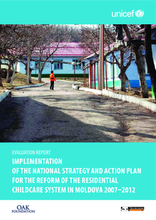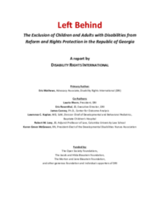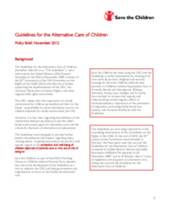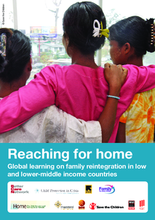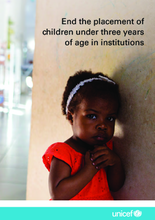Displaying 81 - 90 of 191
The Infant Mental Health Journal has published an important Special Issue on Global Research, Practice, and Policy Issues in the Care of Infants and Young Children at Risk. This article documents how between 2005 and 2013, the Government in the Republic of Georgia closed 32 large, state-run institutions housing children without adequate family care.
Infant Mental Health Journal has published an important Special Issue on Global Research, Practice, and Policy Issues in the Care of Infants and Young Children at Risk. This article documents an initiative to establish a replicable professional model that would direct the child welfare system in the Nizhny Novgorod Region away from institutional care and toward services for young children and their families that reduce the risk of institutionalization.
This report is based on a synthesis of eight assessments of the implementation of the Guidelines for the Alternative Care of Children (“the Guidelines”) in Benin, Gambia, Kenya, Malawi, Tanzania, Togo, Zambia and Zimbabwe.
This article closes a special edition focused on the state of child protection in 16 countries chosen to represent very different cultural contexts, historical backgrounds, and social welfare systems with special attention to out-of-home care placements, principally family foster care and residential care, though several aspects related to adoption were included as well.
The Government of the Republic of Moldova launched its childcare reforms in 2006 aiming to establish a network of community social assistants, develop family support services and alternative family placement services, and reorganise residential childcare institutions. This evaluation reviews the implementation of the National Strategy and Action Plan for the Reform of the Residential Childcare System 2007–2012 approved by the Government of the Republic of Moldova in July 2007.
This hard-hitting report by Disability Rights International is the product of a 3-year investigation into the orphanages, adult social care homes and other institutions that house children and adults with disabilities in the Republic of Georgia. It finds that although the Government of Georgia has undertaken an ambitious child care reform process over the last decade, institutionalized children with disabilities were largely excluded from this reform process.
This important study on foster care practices in India provides important insight into the history, approaches, challenges and opportunities facing the development of foster care services in the country, presenting a picture of foster care practices across nine Indian states.
This policy brief by Save the Children introduces the background, goals, and guiding principles of the Guidelines for the Alternative Care of Children endorsed by the UN General Assembly on the 20th of November 2009 while also explaining why family-based care is a preferred care arrangement over institutions. Furthermore, it suggests policy and practice recommendations to further protect children without appropriate care and strengthen families and communities.
This inter-agency, desk-based research aims to arrive at a clearer understanding of reintegration practices for separated children in low and lower-middle income countries. The research pulls together learning from practitioners and academics working with a range of separated children, such as those torn from their families by emergencies, children who have been trafficked or migrated for work, and children living in institutions or on the streets.
On the 22nd October 2013, a new regional campaign in the Latin American and Caribbean region was launched to end the placement of children under three years of age in institutions.

